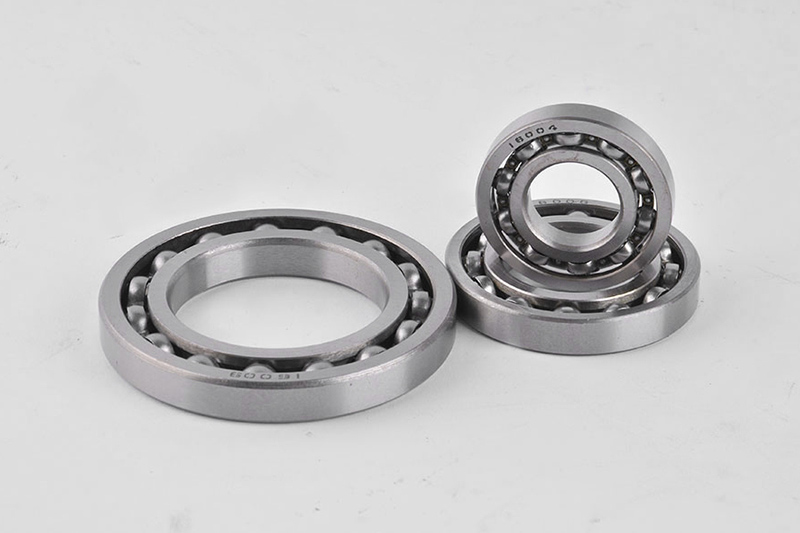Series 1600 Chrome Steel Deep Groove Ball Bearing
Product Overview The Series 1600 Deep Groove Ball ...
1. Simple and reliable structure
The design of deep groove ball bearings consists of inner ring, outer ring, rolling element (steel ball) and cage, and the overall structure is very simple. Due to its relatively simple structure, it requires low technical requirements and cost in manufacturing, and is also easy to mass produce. This type of bearing not only has a low production cost, but is also very reliable and suitable for equipment in almost all mechanical fields. More importantly, its working principle is clear and the operation is relatively simple, and even if a fault occurs, it is easy to identify and solve.
2. Ability to withstand multiple loads
A significant advantage of deep groove ball bearings is that they can withstand radial loads and axial loads (one-way or two-way). Radial load refers to the load along the radius of the bearing, while axial load refers to the load along the axis. Most bearing types can only withstand one type of load, while deep groove ball bearings can withstand both types of loads at the same time due to the special design, which makes them very suitable for complex mechanical applications. For example, in automobile engines and industrial motors, bearings usually need to withstand both types of loads at the same time, and deep groove ball bearings are very suitable for these applications.
3. High speed capability
The rolling elements (steel balls) of deep groove ball bearings have a small contact area with the inner and outer rings, which means that they have relatively low friction. Low friction allows deep groove ball bearings to operate at higher speeds without being easily damaged by overheating or wear. Deep groove ball bearings are widely used in equipment that requires high-speed rotation, such as power tools, fans, and car wheels. Especially in equipment that requires precision and high-speed operation, deep groove ball bearings can provide stable operation for a longer period of time.

4. Low noise and low vibration
Due to the way the rolling elements of deep groove ball bearings contact the inner and outer rings, they produce less noise and vibration when they operate. Compared with other types of bearings, such as roller bearings, deep groove ball bearings run more smoothly. This is crucial for many applications that require low noise, such as home appliances, medical equipment, precision instruments, etc. For example, in home appliances, if the noise of the bearing is too loud, it will affect the user experience, and deep groove ball bearings can effectively reduce these noises.
5. Simple maintenance
The structural design of deep groove ball bearings is very simple, so they do not require complex maintenance procedures. Routine lubrication and cleaning usually ensure the normal operation of bearings. Since they have low friction, they are not prone to excessive wear and need to be replaced more frequently. This is very important for most industrial equipment that requires high reliability. Even in harsh environments, proper lubrication and maintenance can effectively extend the service life of bearings and reduce maintenance costs and downtime.
6. Wide range of applications
Deep groove ball bearings are designed to be very versatile and can adapt to a variety of different application scenarios. Whether it is heavy machinery with high loads and low speeds, or light equipment running at high speeds, deep groove ball bearings can do the job. These bearings are widely used in industries such as industry, power tools, household appliances, automobiles, and aviation. For example, in electric motors, deep groove ball bearings can effectively support the rotation of the motor rotor; in household appliances, they are commonly found in equipment such as fans and washing machines.
7. Standardized dimensions
Deep groove ball bearings have standardized dimensions, and manufacturers provide a variety of standard models according to different application requirements when designing. This means that users can easily find suitable replacement bearings around the world, and inventory management is simpler. Standardized dimensions also make mass production and maintenance of products more convenient. When the equipment fails and the bearing needs to be replaced, users can easily find the right parts, avoiding the extra trouble caused by size mismatch.
8. High load bearing capacity
Despite the relatively simple structure of deep groove ball bearings, they can still withstand certain high loads. Especially in deep groove ball bearings made of high-quality materials (such as high-carbon steel or stainless steel) and precision machining, their load-bearing capacity is even better. In some applications that require high load-bearing capacity, such as heavy machinery, transportation equipment, etc., the reliability and load-bearing capacity of deep groove ball bearings are particularly outstanding. Through the selection of materials and precision control, deep groove ball bearings can provide higher load-bearing capacity and durability.
9. Suitable for a variety of working environments
Deep groove ball bearings are not only suitable for normal temperature working environments, but also can be used in certain extreme environments. By selecting different materials, such as stainless steel, ceramics, etc., deep groove ball bearings can meet special needs such as high temperature, low temperature, and corrosive environments. For example, stainless steel deep groove ball bearings can maintain stable operation in humid and corrosive environments, while ceramic deep groove ball bearings are suitable for use in extremely high temperatures or special chemical environments. Therefore, their versatility and adaptability enable them to be widely used in multiple industrial fields.
10. Cost-effectiveness
Due to the simple structure, mature manufacturing technology, low production cost, low maintenance requirements and long service life of deep groove ball bearings, they have great cost advantages. For most companies, choosing deep groove ball bearings can not only reduce the initial purchase cost, but also reduce the cost of maintenance and replacement, thereby improving the overall cost-effectiveness. This cost-effectiveness makes deep groove ball bearings a standard accessory in many industrial equipment, especially in cost-sensitive industries.